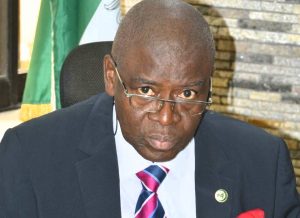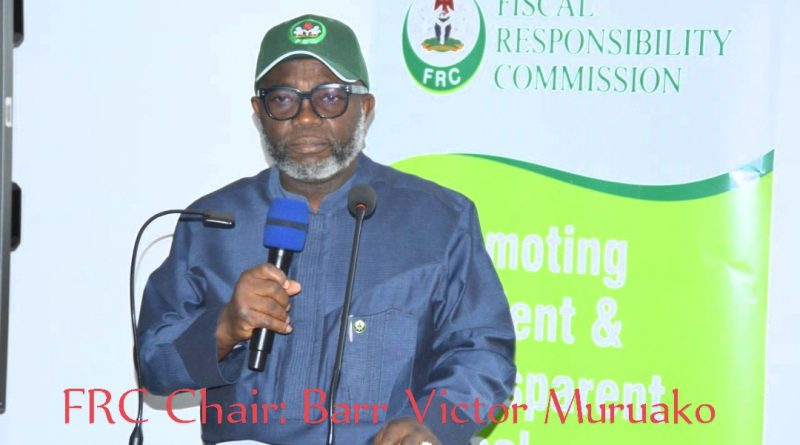SUBNATIONAL FISCAL RISKS, SFTAS AND THE FISCAL RESPONSIBILITY COMMISSION
Chris UWADOKA
In Managing the Nigerian economy, the federal government is continually confronted with “Fiscal risks,” a technical term for uncertainties that may cause fiscal outcomes (expected public sector revenue, expenditure, borrowing, debt repayment, etc) to deviate from earlier forecasts or expectations.
For a subnational entity (States and Local Governments, in the context of Nigeria), a fiscal risk could materialize from various sources, including contingent liabilities, and institutional weaknesses. Let’s take the example of a contingent liability in the form of a huge judgement debt secured against a State Government and the creditor proceeds to execute a garnishee order against the government. Given that the State is forced to part with substantial resources outside its budget plan, the execution of its budget for that year will suffer. A corollary of this is that the state may no longer be able to execute its budgeted plan of paying salaries and pensions as well as undertaking construction of new school buildings, repair and equipping of existing health centres, etc. The damage control options open to such a State Government are: (i) to resort to unplanned borrowing; (ii) to ask the Federal Government (FG) for help or (iii) where the earlier options are not available, to stew in its financial mess. Each of the three options puts pressure on the fiscal health of the FG.
Unplanned borrowing by a subnational entity is a latent risk to the Federal Government which, inexorably, bears its ultimate guarantee. Where the debtor fails to pay according to terms, the pressure of the failed loan on the financial system invariably translates into a fiscal risk for the federal government; and where the Federal Government has steps in with a bailout for the state, the fiscal plan of the Federal Government is impacted as it has had to spend on emergency outside its Medium Term Expenditure Framework. Where, for purposes of argument, the state is allowed to stew in its own financial mess, the social fallout from the failure of the State Government to meet its salary and developmental obligations may eventually lead to a breakdown of law and order which risks spreading to other States and setting the entire nation ablaze, in a manner of speaking.
It is the devil’s alternative: Whichever way it goes, the Federal Government must lose.
Incidentally, if not unfortunately, Nigeria’s fiscal architecture denies the federal government the power to compel state governments to manage their finances well. This is even though the cost of poor public finance practices by subnationals is eventually and inexorably transferred to the federal government. Hence, the FG finds itself with little or no other good choice besides proactively promoting and supporting good fiscal responsibility practice at subnational levels.
The boldest initiative of the Federal Government until recent times is the enactment of the Fiscal Responsibility Act in 2007 and the establishment of the Fiscal Responsibility Commission shortly after.
The Fiscal Responsibility Act mandates the Federal Government to offer technical assistance to states and local governments that desire to domesticate the Fiscal Responsibility Act in their domains. The Act also encourages states and local governments to structure their revenue and expenditure frameworks along the lines of the Medium-Term Expenditure Framework and other budget documents introduced in the Act. In line with the foregoing, the Fiscal Responsibility Commission has been strategically engaging and persuading state government officials and Civil Society Organisations (CSOs) based in States to take seriously the issues of structured frameworks for fiscal behavior, transparency, accountability, etc. By 2015, after half a decade of engaging State Governments using moral suasion, the Commission could boast of 13 states that had enacted Fiscal Responsibility Laws, out of which a smaller number had proceeded to set up their corresponding Commissions to implement the law.
Around 2015, the consequences of decades of careless fiscal management amongst subnational entities crystalized into a near-fiscal crisis for many states whose governments could not as much as pay the salaries of their civil/public servants. The Honourable Minister of Information and Culture, Alhaji Lai Mohammed, captured the scenario clearly while addressing newsmen at the end of a weekly virtual Federal Executive Council (FEC) meeting early in July 2022 when he was quoted as saying, “I think this is a good opportunity to also let you know exactly what the Federal Government has done between 2015 and today, to ensure that states stay afloat.
Honestly, without the federal government bailout, most states would have gone under.” He reminded the press that when the government of President Muhammadu Buhari came to power in 2015, as many as twenty seven states could not pay salaries and the Federal Government had to bail them out by giving them money to pay salaries, and arrears.
Chief Lai Mohammed is reported as further stating that the bailout of the 27 states was just the beginning. “Now, in addition,” he remarked, “we found out also that the states were in difficulties and they could not start any work, in terms of infrastructure, and the federal government gave each of them N10 billion.” That was still not the end. He added, “When the price of oil, again, collapsed and states were in trouble, the federal government gave out a bailout of a billion naira per month to each state for eight months and N800 million per month, per state, for over eight months and the records are there.”
Having helped once, the Federal Government found itself continually having to splash unplanned bailout money on states. On the part of the states, having found the Federal Government a ready and willing savior, appear to want to extract every help they can for as long as they can, irrespective of the damage it may do to the fiscal position of the FGN.
The psyche of the entitled appears to have kicked in amongst state governments and one wonders if the dependency will ever end. Subnational fiscal risks (which in the context of this work are fiscal risks to the federal government emanating from problems in the finances of states and local governments) have become a very present reality in Nigeria; and a very present danger to the Federal Government’s fiscal health. While FGN grapples with its own unenviable problems of fiscal sustainability, it finds itself continuously looking over its shoulder for danger from subnational fiscal risks lurking in the next corner.
Following the realization of the danger that subnational fiscal risks posed to the FGN in 2015, the question arose as to what could be done to improve fiscal coordination of states by the FG? Or at least, how could the FGN be availed a good understanding of the fiscal situation of a State Government before fiscal risks materialize? It was regarding this question that the Federal Government requested World Bank financing to establish a system of performance-based grants to States, conditional on sustained implementation of national fiscal management plans.
The result is the State Fiscal Transparency, Accountability and Sustainability (SFTAS) Program structured to last from 2018 to 2022.
To incentivize states to adopt good fiscal practices which they should have been using in the first place, the World Bank-funded SFTAS programme set aside $1.5 billion for disbursement as grants to states that bring their Public Finance Management architecture up to speed. A state desiring to participate must meet two otherwise simple, if not simplistic Eligibility Criteria: (i) publish annual state budgets; and (ii) publish audited financial statements. Thereafter, a state can access the financial grant according to certain disbursement-linked Indicators. The disbursable grant size to a State in a given period depends on the number of disbursement-linked Indicators achieved. Those too are basic good practice issues which any government that respects itself would long have adopted.
Well, Economists understand incentives and State Governments understand free money.
By 2020, all 36 states of the Federation had met the eligibility criteria for the year and become eligible to receive performance-based grants. Results to date (September 2022) indicate that States are “performing strongly across all zones.” Interestingly, when it is said that States are performing strongly, it is not as if the states are clearing land mines and their Governors are killing lions with their bare hands. It is just to say that they are having records such as: Two-thirds of States are engaging citizens in their budget process and publishing Citizens Budgets; half of states have passed a consolidated state revenue code; 17 States achieved annual IGR growth of at least 20 percent; two-thirds of States are addressing payroll fraud through linking biometric data and Bank Verification Numbers to payroll; 21 States have strengthened public procurement laws; Two-thirds of States have fiscal responsibility and public debt laws; 32 States submit quarterly debt reports to the DMO; a number of States have started to clear their domestic expenditure arrears (owed to contractors, civil servants and pensioners); etc. Those are the strong achievements that are earning State Governments a whopping $1.5 billion windfall.
The problem now is that SFTAS, as a 2018 – 2022 programme will close in December 2022. With no free money to run after, how would State Governments continue in the path of fiscal responsibility? Even as it is now, with $1.5 billion to share, not all states could muster the good sense to jump in early enough, and not all are maximizing their potential access to the free dollars by meeting the performance required for the grant. What then could happen to propriety in subnational finances if the SFTAS carrot disappears in three months’ time (December 2022), given that Nigeria’s fiscal federalism gives each state full responsibility for its own economic management decisions?
To sustain and deepen the results of SFTAS, recourse must be made to the boldest public finance reform initiative of the federal government – the Fiscal Responsibility Commission. The tribal knowledge assembled by the Commission which, all these years, has patiently but persistently engaged State Governments using technical assistance, moral suasion, name-and-shame, peer comparison, etc need to be harvested. For one, a worthwhile sustainability strategy would include supporting the Commission to monitor States against sustained implementation of the SFTAS eligibility criteria and performance indicators. Also, the Commission’s long-standing engagement with Civil Society organisations (CSOs) in the area of outreach activities will come handy towards creating demand-side pressure for States to sustain the reforms and results on fiscal transparency and accountability.
It does appear, in the final analysis, that given Nigeria’s fiscal architecture, the Fiscal Responsibility Commission is a sine qua non, a without-which-not in the goal of managing subnational fiscal risks and eventually weaning States of the Nigerian Federation off a culture of bailouts. Without a deep coordination with the Commission towards sustaining the gains of SFTAS, the World Bank-funded SFTAS programme may be recorded in time to come as an expensive attempt to mop the subnational fiscal floor with the tap still running.
 Chris UWADOKA (chrisuwadoka@hotmail.com 08038127484) is an Abuja-based economist.
Chris UWADOKA (chrisuwadoka@hotmail.com 08038127484) is an Abuja-based economist.




